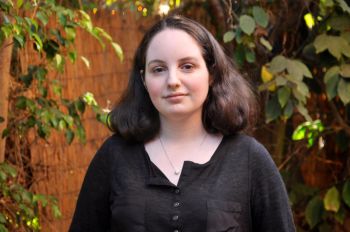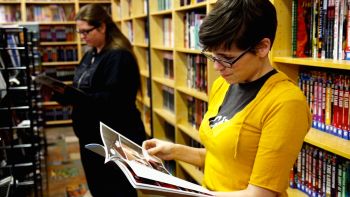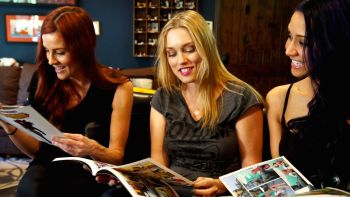By Anna Weinstein.
There are few documentaries about comic books and even fewer about women in comics. In fact, according to Marisa Stotter, the director of the new documentary She Makes Comics, her film is the first to explore women behind the “ninth art.” Stotter is a recent graduate of Wesleyan University and is currently based in Los Angeles. She has worked on several short films and is now producing her first full-length feature. As she explains in the interview below, She Makes Comics is a passion project, borne out of her love of comics and a desire to see greater representation of women in the medium.
Amazing that this is the first documentary to tackle this subject. Is this something you’ve been thinking about for a while, the role women have played in the comic book industry?
This was always interesting to me really. There have been some documentaries about female superheroes, but there hasn’t been a documentary about female creators, the women actually behind the scenes. So I wanted to sort of pull back the curtain and show that women have been involved in creating the comics for decades.
And yet still, it sounds like it’s always been a bit of a man’s game.
 Absolutely, but there are women who have been in the trenches with comics, too. I mean, Joyce Farmer, who was the artist of the “Tits and Clits” comics back in the 70s — at the time, the government was trying to interfere and get these comics off the shelves, so she and her co-creators, they were nearly arrested for the comics.
Absolutely, but there are women who have been in the trenches with comics, too. I mean, Joyce Farmer, who was the artist of the “Tits and Clits” comics back in the 70s — at the time, the government was trying to interfere and get these comics off the shelves, so she and her co-creators, they were nearly arrested for the comics.
I’d say that qualifies as “in the trenches.” So when did you first become interested in comic books?
I really got into comics my freshman year of high school when I took an English class where we read Perseverance and Maus. Before reading those books, I thought of comics as a lot of superhero stuff that I wasn’t particularly interested in. But when I read those two, it just kind of blew open the doors for me and made me realize that comics could be greats works of literature and great works of art. And I guess sort of stumbled down the rabbit hole from there.
You were reading these through a literary lens.
Exactly. I was actually an English major in college even.
Really? Not a film major?
I took a lot of film classes at Wesleyan and fell in love with film, but literature was always my first love.
So how did you get started in the film industry? Or was this your first project?
 I came out to LA in 2012 to do an internship. I was working as a development intern at the production company that does The Walking Dead. So I was getting pretty steeped in the entertainment industry at the time. And then I started working with my co-producers, Patrick and Jordan, on a documentary they were wrapping up. And as things were winding down with that film, we were talking about another project, so I had an opportunity to pitch them this idea. So that’s where this project originated.
I came out to LA in 2012 to do an internship. I was working as a development intern at the production company that does The Walking Dead. So I was getting pretty steeped in the entertainment industry at the time. And then I started working with my co-producers, Patrick and Jordan, on a documentary they were wrapping up. And as things were winding down with that film, we were talking about another project, so I had an opportunity to pitch them this idea. So that’s where this project originated.
And Patrick and Jordan are the founders of Respect Films?
Right. I knew Patrick because we were both alumni from Wesleyan, and he had brought out a film he’d made for a screening. I introduced myself afterward, and then we stayed in touch a bit.
Tell me about the funding process for this film. This was a Kickstarter campaign?
Respect Films has had a lot of success with Kickstarter in the past, so we decided to crowdfund because we knew there was a huge comic fan base out there interested in seeing a project like this come to life. We ended up getting an overwhelming amount of support. We initially set our goal at $40,000, and we exceeded that and ended up at about $60,000. I think the final number of people who pledged was close to 1,500. So there was really an outpouring of support for the project, which was pretty validating.
And you have a built-in audience as well now.
You know, I personally believe that to have something successfully crowdfunded on a site like Kickstarter is a way to tell potential buyers that there’s already an audience for this sort of thing. So yeah, I think it’s hugely helpful going forward, having this Kickstarter community — to say, these people clearly want it, they helped make it happen, so judging by this, there’s an audience here. So we really hope to leverage our Kickstarter experience moving forward.
What did the process look like for finding your interviewees? How did you select your subjects?
 There were a lot of women who heard about the campaign and approached us, some who we were going to approach anyway, so it worked out. But we started interviewing people before the campaign got underway, actually. And I think at first, understandably, there were some people who were a little skeptical about the project. They didn’t know us, they didn’t know what our angle was, and I think when they saw the Kickstarter campaign and the amount of support it was getting, that helped to legitimize the project. We got a lot of people approaching us at that point, saying they wanted to be involved. Really, we were thrilled to have so many people express interest and want to be involved in one way or another.
There were a lot of women who heard about the campaign and approached us, some who we were going to approach anyway, so it worked out. But we started interviewing people before the campaign got underway, actually. And I think at first, understandably, there were some people who were a little skeptical about the project. They didn’t know us, they didn’t know what our angle was, and I think when they saw the Kickstarter campaign and the amount of support it was getting, that helped to legitimize the project. We got a lot of people approaching us at that point, saying they wanted to be involved. Really, we were thrilled to have so many people express interest and want to be involved in one way or another.
How much research did you do for the film? Or did you go into it already with a solid knowledge base/list of women you wanted to approach?
I had women I wanted to talk to, but I had to research as well. I started researching in August, 2013, and I really don’t think there was a point when I stopped gathering information. As we conducted more interviews and someone would bring up a name or a comic that I wasn’t familiar with, I’d dive back in and see if that was something worth exploring. So it was sort of an ongoing researching and learning process — which, as a recent college grad, was not unfamiliar to me.
How many people did you end up interviewing in all?
Almost fifty people, and we interviewed from September 2013 up until early November 2014. A lot of it was due to scheduling, but also seeing what we had and what we still needed. So we were shooting very close up until our release.
Was a lot of your budget for travel, to get the interviews?
Yeah, we traveled to a lot of people, individual people and also to go to conventions where they were all gathered in one place. We flew all over the country, in every corner, to get particular interviews that were important for us.
How many people went with you? What did your crew look like?
Sometimes it was the three of us — me and my co-producers. Jordan functions as our cinematographer, so he’s really the essential personnel. There were a couple of interviews where only Jordan could make it, and actually for one interview, Jordan flew out to Portland to physically, and I conducted the interview over Skype. So we got technical to ensure that we got the interviews even when I couldn’t be there physically.
Did Jordan and Patrick already know some of these women, since they’d been working in the comic book world?
Yes, we reached out to a lot of people that Patrick and Jordan had relationships with. But we also had the benefit of having as one of our co-producers, Karen Green, who is the comics and graphic novels librarian at Columbia University. She’s a well-known person in the comics industry, and she would reach out to people on our behalf, so that was very helpful. And the more the project got underway, there were people who would contact us saying, hey, you know I’ve got a friend of mine, so-and-so, who I think you should interview.
So it sort of became this whole interconnected web of people in the industry.
What was the best part of the filmmaking process for you? You edited the film as well?
I did, edit the film, yes. But really, it was amazing to be able to interview these women who I’ve been a huge fan of for a long time. It was absolutely thrilling to actually meet them and have conversations about comics and women in the industry and all these things that are really important to me. It was just a personal dream come true for me. The interviews were definitely the most fun part for me.
So tell me about the editing process. Is this where the film came together for you? What did the process look like for building a narrative?
 I’d say that through interviewing the women, we got an idea of where the story was going to go. And then the closer we got to our final interviews, the more we narrowed in on what specifically we wanted to talk about. The problem with any project of this magnitude, of course, is striking a balance between breadth and depth. And we didn’t want it to just be a collection of facts that we were throwing at people. So we did have to pick and choose what we wanted to represent and how deep to go into those stories.
I’d say that through interviewing the women, we got an idea of where the story was going to go. And then the closer we got to our final interviews, the more we narrowed in on what specifically we wanted to talk about. The problem with any project of this magnitude, of course, is striking a balance between breadth and depth. And we didn’t want it to just be a collection of facts that we were throwing at people. So we did have to pick and choose what we wanted to represent and how deep to go into those stories.
In terms of marketing, are you reaching out to the female producers and directors in the industry?
Not really. I think that the niche aspect of the topic kind of precludes us from saying that this is something that could apply to women in the film industry. It certainly has applications, and there have been a lot women in the film industry who are comic book fans who have demonstrated interest in the film.
But part of the issue is that this is such a specialized topic that a lot of people say, well, if you’re not a comic book fan, you won’t get anything out of it. Although, we maintain that if you’re interested in social issues of feminism or popular culture or creativity, it’s a film you would enjoy.
So it’s sort of a balancing act, I suppose, to demonstrate that this is a topic that can have a wider reach beyond just comic book fans while at the same time being a very specific topic.
So if people want to see the film, how can they do that?
They can purchase the film as a DVD or digital download from the Sequart store. They are an organization dedicated to comics, literacy, and research, and they’re acting as our direct distributor. Certainly, we’re going to be doing a lot of screenings at conventions around the country and some film schools, and we’re exploring our options to possibly sell it to television, so I have no doubt that there will be lots of options for people to see the film.
For more information about She Makes Comics and other films produced by Respect Films, visit their website at http://respectfilms.com.
Anna Weinstein is a frequent contributor to Film International.

